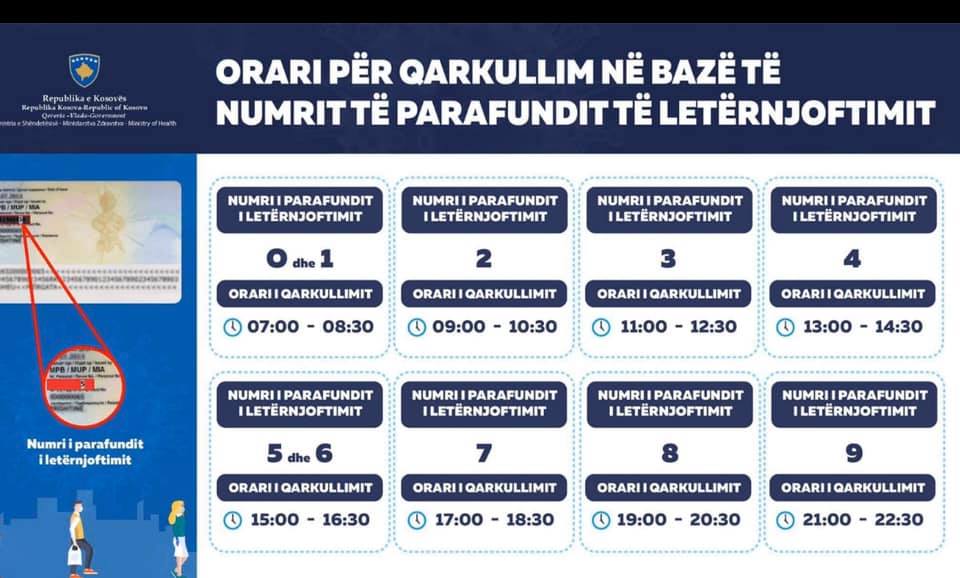

Kosovo residents are to be allocated 90 minute time slots in order to make essential trips according to new government measures designed to prevent the spread of the coronavirus, which are set to come into force on Wednesday and apply until May 4.
In an attempt to contain the spread of coronavirus in Kosovo, the Ministry of Health has announced a decision to implement new measures that will be in place from April 15 until at least May 4.
Freedom of movement will be further restricted from Wednesday at 06: 00. Movement will be restricted to ninety minutes per day, during a specific time slot allocated based on the penultimate digit of identity documents.
For Kosovo citizens, the schedule is determined by the penultimate digit of the personal number on the back of their ID card, while for foreign citizens, or Kosovo citizens not possessing an ID card, it is based on the penultimate digit of their passport number. 
Minister of Health Arben Vitia stated at a press conference on Monday that the decision was calculated to limit the movement of people as much as possible. He estimated that around 40,000 citizens would be permitted to go out during each individual time slot, which institutions consider to be manageable.
Freedom of movement within this timeframe is only permitted in order to perform financial tasks and purchase essential items, including food and medicine for people and animals. Accompaniment while undertaking these tasks is not permitted, except in the case of disabled persons and children under 16.
The ministry’s decision also states that while outside of the house, citizens must “keep the mouth and nose covered, through a mask, scarf, or other cover” and “maintain a distance of two meters from other persons.” It is recommended that people over the age of 65 do not leave the house at all, except in emergencies.
Exceptions to the restrictions are provided for certain economic operators to be made public at a later date, as well as those providing goods and services that are part of the supply chain for essential items. Special ‘circulation permits’ will also be provided to essential staff of state institutions.
Leaving the house to seek medical help is also permitted, while the restrictions on movement do not apply to victims of domestic violence, who are entitled to leave their homes to seek help.
The decision states it is “strictly forbidden” to leave the house for any other reason “including social gatherings, family visits, etc.”
There are also restrictions on driving, with the use of vehicles prohibited except in rare cases, including the aforementioned economic operators and those essential to the supply chain.
Exceptions are also made for essential staff, people with disabilities and people seeking medical help. Even for those exempted from the restrictions, no more than one passenger is permitted, except in emergencies.
Violating the new measures can carry a fine of 1,000 to 2,000 euros, while business can receive fines of 3,000 to 8,000 euros.
The measures are set to be reviewed by the Ministry of Health in consultation with the National Institute of Public Health, to assess whether the measures are effective, and whether they should be continued. “We will re-analyze the epidemiological situation every day, and may change, supplement or repeal the prescribed measures,” the decision states.
The Ministry of Health’s decision was taken in consultation with other ministries and Kosovo’s mayors through the Association of Municipalities, and will be implemented by the municipalities.
Opposition party the Democratic Party of Kosovo, PDK, have criticised the measures, stating that the Constitutional Court has already ruled that “laws on the prevention and control of infectious diseases do not in any way entitle the Ministry of Health and the Government to restrict constitutional rights and freedoms throughout the country.”
The party argues that the new measures represent “the same anti-constitutional decision to restrict the freedoms of citizens,” adding that such measures should only be put in place following a “special law issued by the Kosovo Assembly.”
The National Institute of Public Health confirmed 15 new confirmed cases of coronavirus on Monday, bringing the total to 377. The Institute also announced that a 38-year-old woman from the village of Lladovo near Istog died on Sunday after testing positive for the virus, becoming the eighth recorded death.
Director of the Institute, Naser Ramadani, hailed the ministry’s new measures on Monday night. “These decisions will have a great impact on the well-being of our population,” he said. “We are doing our best to save as many lives as possible, we promise you. Stay at home, keep two metres apart, and take care of your personal hygiene.”
13 April 2020 - 23:47